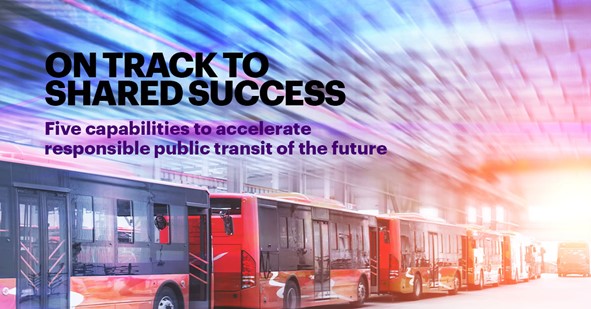Blog
Journey to Responsible Public Transit of the Future
Nicole Goebel
14 December 2020

Journey to Responsible Public Transit of the Future
Stakeholder responsibility has always been paramount in public transit, but never more so than now. We recently undertook research on responsible business, grounded in the views of 35 senior decision makers and thought leaders across major global public transit operators and authorities.
As we finalized our research, COVID-19 spread around the globe, reinforcing the importance of responsible business in transit. Since then, passenger and employee safety, for instance, have taken on new meaning, with operators putting protective measures in place to prevent the spread of infection.
How can public transit operators and agencies survive and thrive in this radically changed landscape? They need to redefine what responsibility signifies for them and their stakeholders— customers, employees, regulators, suppliers, partners and investors. This involves looking holistically at their operational agility, individual users, the environment and society.
COVID-19 has further reinforced that responsible business is highly crucial for the public transit sector. It has to be addressed from a holistic perspective— for individuals, society, the environment and operators‘ own agility.
The 35 senior executives interviewed shared their top priorities and barriers for responsible business as well as what might help them clear any hurdles. They voiced the following responsible business priorities for the future:
Priorities for success:
1. Provide safe, reliable and on-time transport services to commuters.
2. Reduce negative environmental impacts of operations and products/services.
3. Provide accessible services to the elderly, differently abled commuters and other vulnerable community members.
4. Focus on developing services that have a positive human and societal impact.
5. Create a more equal workplace culture.
Barriers to success:
1. Complex governance model.
2. Bureaucracy/cumbersome processes.
3. Lack of investment capacity/funding.
4. Legacy assets and technology.
5. Complexity of working with business partners/suppliers on responsibility-related topics.
A common issue underpinned the barriers: the lack of a strong vision to align across stakeholder groups. The executives interviewed understand that collaboration is required but many don’t have plans to achieve it within
the next three years. Respondents may be working on programs with customers, suppliers and employees but not holistically. And in many of those areas, they are providing only the basics, such as promising fair terms to suppliers.
To best serve their stakeholders, operators and agencies need to be the linchpin in an ecosystem of partners.
With their community trust and network reach, operators and agencies can drive the necessary changes, helping
ecosystem participants balance the long-term interests of individuals, the environment, society, and their businesses to build resilience and stakeholder trust.
Based on these insights, we developed a blueprint for shared success among public transit stakeholders. Our research points to five capabilities that public transit operators and authorities need to redefine and accelerate responsible business.
Our research points to five capabilities to accelerate responsible business:
1. Innovate with purpose
2. Act as an urban mobility mapper
3. Put the workforce at the heart of your business
4. Shape technology to benefit workers and commuters
5. Drive operational agility
Category: Blog
Tags:
About the author

Nicole is a Managing Director at Accenture, a leading global consultancy and professional services company with over 509.000 employees in more than 120 countries. Here she focuses on the Mobility industry and leads Accenture’s Rail and Transit business in Europe. Nicole holds a degree in tourism economics with majors in computer sciences and marketing and has more than 25 years of experience within the industry at railways, airlines and tour operators.